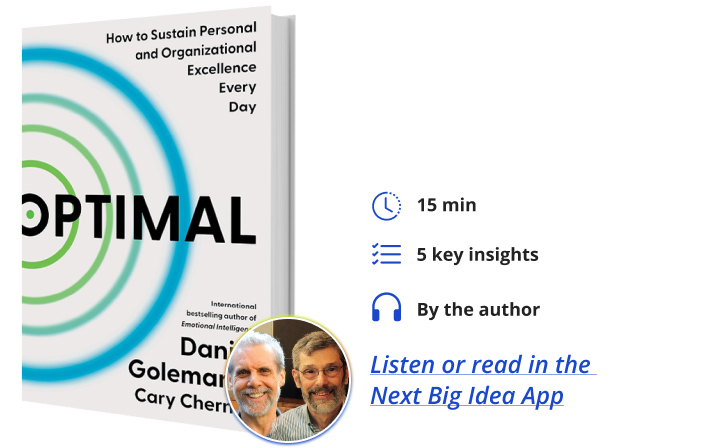Daniel Goleman is a bestselling author and journalist. He was a science reporter for the New York Times, was twice nominated for the Pulitzer Prize, and received the American Psychological Association’s Lifetime Achievement Award for his media writing.
Cary Cherniss is Professor of Applied Psychology and Director of the Organizational Psychology program at Rutgers University. Cherniss specializes in the areas of emotional intelligence, work stress, leadership development, and planned organizational change.
Below, co-authors Daniel and Cary share 4 key insights from their new book, Optimal: How to Sustain Personal and Organizational Excellence Every Day. Listen to the audio version—read by Daniel—in the Next Big Idea App.

1. Be kind to yourself.
She was a nurse in a Boston hospital, working in the intensive care unit during a surge in Covid. Day after day, she was treating patients who were suffering the worst, many of whom died. Her work made her feel awful.
But that nurse made an intentional decision not to let this destroy her own well-being. So she got up earlier every day so she could start it with a long run. She organized Zoom get-togethers with close friends where they talked about fun memories or plans—not their troubles. She did a round of yoga and meditation. She called friends and family she hadn’t seen in years just to reconnect. She felt she was spreading joy.
In effect the nurse was fighting the forces that too often lead to emotional exhaustion and burnout. What she did gives us several strategies for beating constant stress.
Find meaning. A sense of purpose helps buffer stress and makes us more likely to reappraise events in light of some deeper meaning. Studies show that people with a purpose-focused life are less likely to brood about stresses and setbacks and are quicker to recover their inner equilibrium.
Focus on what’s important to you, even when faced with toxic levels of stress. Meditation can help here. All meditation at base retrains attention so you can concentrate better. Research finds that these mental workouts make us less reactive to stress and help us recover from it more quickly.
Take a break. Our bodies are designed for bouts of stress arousal, but then need a period of recovery. For instance, balance work and the rest of your life—the two are often in a tug-of-war —which means you may need to schedule time for family and friends. In fact, see that you make time daily for whatever restores you—playing with a pet or child, walking in nature, time with loved ones. You’ll return to the fray with renewed energy, clarity, and calm.
2. Be kind to others, too.
Think of a boss you’ve had or heard about whom you loved. Now, think of one you or everyone hated. What’s one trait that made that boss so loved or hated?
That’s a question about leadership that I’ve asked groups around the world. By the way, anyone in a position of authority, like a parent or teacher, is a “leader” in that situation. The answers everywhere are surprisingly similar: the traits that people love mean a leader is approachable, trustworthy, and caring.
“A good AI program certainly could seem to have cognitive empathy and a surface emotional empathy, but is unlikely to care about how its actions impact people.”
The key to being a leader that people like comes down to how you show empathy. To be more specific about what “empathy” means, there are three kinds, each based in different circuits in the brain. One kind is cognitive empathy, understanding how the other person sees their world. It’s more than just their perspective—it’s getting the terms they use to explain their world to themselves and using that same language to message to them most effectively.
Then there’s emotional empathy, sensing how that person feels from moment to moment. This lets you acknowledge their feelings, either explicitly or implicitly, keeping your connection on the same page at a deeper level.
The third is called “empathic concern.” This means you not only get how the person thinks and feels but also care about them and want what’s best. This is like a parent’s love for a child. In a business setting, it might mean a leader who coaches or mentors someone, helping them along in their career. It’s this third variety, caring, that seems a hallmark of loved leaders worldwide.
The first two—cognitive and emotional empathy—alone can be used to manipulate people. A good AI program certainly could seem to have cognitive empathy and a surface emotional empathy, but is unlikely to care about how its actions impact people.
As Reinhold Niebuhr famously put it, “Grant me the serenity to accept the things I cannot change, the courage to change the things I can, and the wisdom to know the difference.” At the organizational level, this awareness lets us know the social realities, such as how decisions that matter to us are made, and what might be changed for the better. At the personal level, empathic concern means being kind within those constraints.
3. Have a great day—but not your best ever.
We hear a lot about “flow,” that amazing state where we do our absolute best that one time we outdid ourselves. But here’s the problem with flow: it happens out-of-the-blue and rarely. If you expect it of yourself daily, you will fail.
It’s far better to aim for “optimal,” a steady series of “good days” where we do our best—we’re more productive, committed, and engaged, feel good while enjoying our work, and connect well with those around us. Aiming for such a day is better than counting on getting into “flow.” Compared to flow, the optimal state underlying a good day is more realistically attainable.
Here’s one method for enhancing whatever we do: pay full attention. Harvard research shows people are distracted about 50 percent of the time, on average. When folks are watching a video screen, commuting, or at work, they’re distracted about 90 percent of the time. But we can take control of our attention, choosing to put our full focus on what we are doing in a given moment. That means we’re not distracted. But the payoff is even greater: we do better and enjoy it more.
“Compared to flow, the optimal state underlying a good day is more realistically attainable.”
We can strengthen the circuits in our brain for ignoring distractions and paying full attention. One way is meditation, almost any kind. At base, every variety of meditation means retraining attention to strengthen our capacity for focus. A daily practice of meditation is like going to the gym every day to strengthen your muscles—except attention training does this for your brain’s circuitry. As with working out at the gym, the payoffs are gradual but very real.
There’s another bonus, one for our success at work. Organizations measure “optimal” through a different lens, through measures that matter for a company: levels of engagement and satisfaction with our job, lowering turnover—that is, being less likely to quit—and helping others out beyond our specific role. For an organization, “optimal” means doing well on measures like performance and engagement. For each of us, it means having a good day.
4. Belonging matters.
One limit of many organizational programs on diversity and inclusion can be seen in their simply getting the right numbers of given groups, proportions that reflect their status in the general population. This may seem to indicate success at “diversity and inclusion,” but if you ignore whether or not those people feel they belong, you’re missing the point.
When Google analyzed its own teams, it turned out one of the hallmarks of the most successful groups was a sense of psychological safety—that, for instance, a team member could risk suggesting a new, creative idea without being put down. Vanessa Druskat, a psychologist at the University of New Hampshire’s business school, studied outstanding teams for decades. Her analysis of what helps a team excel is that members have a sense of belonging.
Druskat’s observations of teams in action yielded a set of pointers. One set details ways team leaders and members act that destroy this sense of belonging. In short, they come down to seeming not to care about what a given team member says: looking at your phone or starting a side conversation when that person is speaking, for example. On the other hand, paying full attention to that person signals he or she belongs, and what they have to say matters.
When these positive ways of acting are agreed on by group members, they become norms, the implicit ground rules for how to behave. Druskat finds that a set of emotionally intelligent norms typify high-performing teams—among them, that everyone there belongs.
To listen to the audio version read by co-author Daniel Goleman, download the Next Big Idea App today:
































